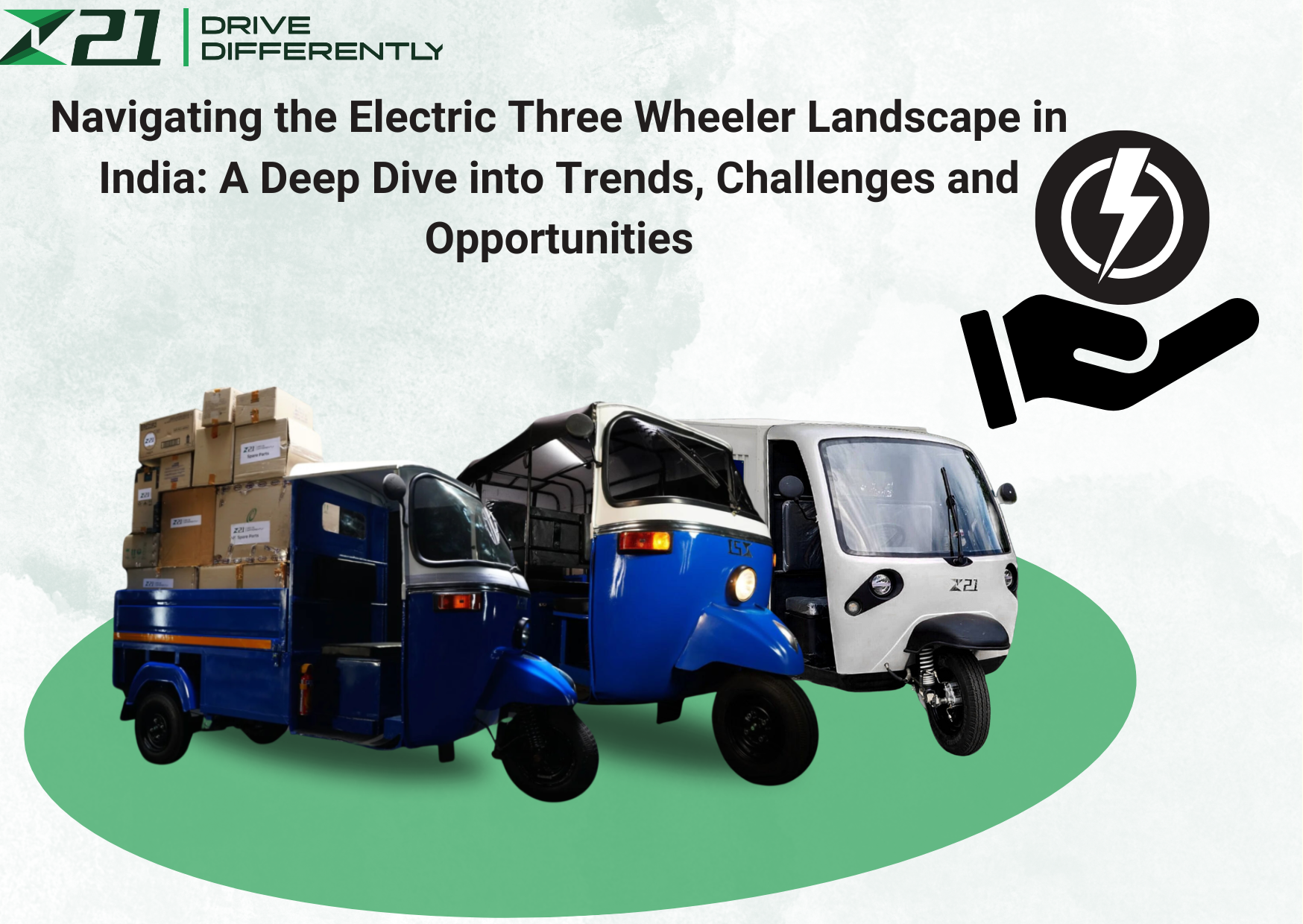The era of electric vehicles is already on the move across the world and it is not left out for India. Out of all the segments, electric three-wheelers are slowly becoming a key vertical to watch out for due to their cost-feasibility, effectiveness as well as the prospect of revolutionizing the first and last-mile transportation. In this blog, we explore the electric vehicle opportunities in India, particularly in the three-wheeler segment, examining the trends, challenges and opportunities that define this emerging market.
The Increasing Market of Electric Three Wheelers in India
India remains the world’s biggest market for three-wheelers, and these taxis are popular in the country’s population-dense as well as rural areas. The shift towards electrification in this segment highlights significant electric vehicle opportunities in India and is driven by several factors:
- Government Initiatives and Policies: FAME II (Faster Adoption and Manufacturing of Hybrid and Electric Vehicles) subsidies these electric three-wheelers to make them more accessible to consumers and operators of fleets.
- Environmental Concerns: Due to increasing levels of pollution in cities, electric three-wheelers are a better solution than ICE three-wheelers.
- Lower Operating Costs: Electric three-wheelers have fewer running and maintenance costs than vehicles that use fuel. This economic advantage makes them ideal for daily use, especially for first and last-mile connectivity as well as delivery services hence increasing electric vehicle opportunities in India.
Global Electric Three Wheeler Market Analysis
There has been a steep rise in demand for electric three-wheelers in the last few years making electric vehicle opportunities in India even more promising. Some notable trends include:
- Adoption by E-Commerce and Delivery Services: The advancement of e-commerce has consequently created a need for environment-friendly means of delivering the products to consumers. Many firms have adopted electric three-wheelers as their means of transport for their operations.
- Technological Advancements: Current electric three-wheelers have batteries integrated in their framework that are better than previous models such as lithium-ion batteries, that provide greater range, and are charged faster.
- Emergence of New Players: Some of the new entrants and traditional car manufacturers are venturing into the electric three-wheeler segment, launching new models that are suitable to Indian conditions. This competitive environment further establishes the increasing prospects of electric vehicles in India for both the manufacturer and the consumer.
This paper aims at identifying the challenges facing electric Three Wheelers.
Despite the promising outlook, the adoption of electric three-wheelers in India faces several challenges:
- Charging Infrastructure: However, the problem of a large number of charging stations still has not been solved, and their availability and reliability is still a concern. There is a need to extend the charging infrastructure to the urban and rural areas.
- High Initial Costs: While Electric Operating costs are less than the traditional Operating costs, the initial investment required for electric three-wheelers is more than the later models. This gap must be closed to drive increased adoption as indicated in the following sections.
- Battery Recycling and Disposal: The expansion of the EV market brings into focus problems associated with battery disposal and recycling.
- Consumer Awareness: The identification suggests that a large number of potential users may not be aware of the long-term advantages of electric three-wheelers, including lower emissions and cost. Awareness campaigns are necessary to open up other electric vehicle opportunities in India because people are skeptical of EV technology.
Emerging Prospects in Electric Vehicle Market in India
The electric three-wheeler segment represents a transformative shift, creating vast electric vehicle opportunities in India across diverse sectors:
- Public Transport: The use of electric three-wheelers for auto-rickshaw and shared mobility services will go a long way in cutting emissions and operations costs for sustainable urban transport.
- Rural Electrification: Electric three-wheelers are central in improving mobility in the rural areas because they provide an affordable and green means of moving goods and people. This role highlights how they can help solve the rural connectivity issues.
- Battery Swapping Solutions: Battery swapping can solve problems such as more time needed to charge and limited range, which will make electric three-wheelers suitable for commercial use.
- Employment Opportunities: This means that the market for electric three-wheelers provides employment opportunities in production lines, repair services, as well as charging stations, which forms part of the economic development.
- Integration with Renewable Energy: If electric three-wheelers are charged by solar charging stations and other renewable energy systems then these e-vehicles can supplement India’s green energy plan.
A Vision of Future of Electric Three Wheeler Industry in India
With India aspiring to reach its EV targets, the electric three-wheeler segment will be a key driver of change. Subsidies and infrastructure development introduced by the government will play a crucial role in the future for addressing current challenges. In addition, the synergies between car manufacturers, technology suppliers, and governments will define the pace of development and growth of the sector.
This is an area that investors and entrepreneurs should watch keenly since the electric three-wheeler segment has a lot of growth and profit-making potential. With the help of the electric vehicle opportunities in India today, and overcoming the current problems, all stakeholders can help to build a more environmentally friendly and efficient transport system.
The current competition in the electric three-wheeler market of India is quite vibrant. With right investments, technology and a strong policy support, this segment can help India transform into a sustainable mobility economy. However if you are interested in this type of electric vehicle, the Zero21 electric three-wheeler vehicle is one of the best developed electric three-wheeler vehicles in this category.


